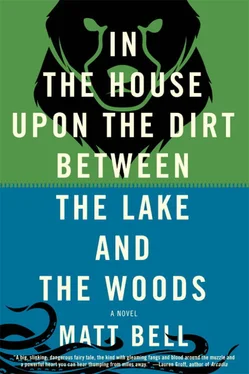She said, Where have you come from?
She pointed to the foundling, shrouded in dirty white, and as her accusing gaze lingered she said, Who is this, and why have you brought him?
And then, as if she had not already broken me, she turned and stepped back across the threshold, shutting the door.
I waited upon the porch, listened at the wood of the house, strained for the clatter and clack of objects within. After some moments had passed the door reopened, and this woman who had been my wife stepped back out onto the porch, reached out a hand. I took her fingers, took too much of them, and weaved them into mine, and though her heat hurt me I did not recoil, had waited too long to pull away in pain. At her request, I left the foundling momentarily upon the slats of the porch, then followed her out onto the dirt, where each step of hers burned away even what few patches of grass there were, and then in a circle of dirt she stopped and turned back, surveyed my wounds, the many leaks and lacerations upon my body.
With her index finger, she counted each, and as she touched them her heat sizzled and then cauterized the wounds shut, until eventually all that was left would stay there, heavy within me.
Amid the pain and stink, again her voice, again saying, Who are you?
Saying, Where have you come from?
Saying, Whose shroud is that upon my porch?
I am your husband, I said.
You left me, I said. Because you had a son, and after you left I looked for you, and later you sent him to look for me—
I said, I am your husband, and you were my wife, and together we had a son.
I said, I promise you, you are my wife still.
She listened to me speak, and then she shook her head.
No, she said. Always I have been here, and always I have been alone. Almost always it has only been me, and no other.
We were naked together upon the dirt, but still we were not as one. When I tried to argue my case, she stopped me, put a finger to my mouth, burned a streak across my already-chapped lips.
Later, she said. I am so tired.
It is time for me to rest, she said, and then she dropped my hand and turned back for the house.
Where will I go? I asked. Where will I go next?
Then come, she said, and it was as easy as that, and then she said, It does not matter to me.
Without waiting she passed through the door and into the house, and then I lifted the foundling and carried him across that threshold, and also the satchel containing the two furs, the one real and one made. While my wife disappeared farther into the house, I returned to the entranceway to shut the door against the day-like light, the almost lack of wind outside. At last husband and wife and child were again gathered under one roof, and that alone was better than what other states had for so long persisted, on all the other floors of this world.
THE LAYOUT OF THE LASThouse was the same as the one we’d shared, and in the front room, I saw a wood-framed sofa like one I had built and that she had upholstered with song, set again before a fireplace clean and piled beside with kindling. On the walls hung framed photographs of our wedding day, pictures that in our first house had been destroyed by the bear, and while my wife had forgotten everything, here everything was. With the spotted tips of my fingers I touched the image of my wife’s face, and also mine, and that couple was long gone now, and it was no wonder she did not recognize us, and yet still there was something there, in or around the eyes, perhaps, or in the set of a mouth, the shape of a nose or neckline: a man and a woman just married, terrible in the potencies of their youth, their early love.
And in the kitchen: All our bowls as they had been when first stacked in their crates, before they were chipped and scratched by the bear’s expulsion of our lives from her cave. All our spoons, shiny upon the wall. All our pots and pans, suspended from their hooks, hung above the hewn-wood counters, and in the pantry only shelves, surfaces bare because I was not there to hunt or to gather, because my wife hadn’t the strength to harvest her garden—and so she had fed the foundling herself, herself nothing.
And in the dining room: A table set for two but with chairs enough for four. A candelabra with no candles. A layer of dust thick enough to hide the desire for family that once inhabited the room.
And in the nursery: The baby blankets my wife had sewn to show me she was trying. The bassinets I built to encourage her to produce what they might hold. The rocking chair I carved, the mobiles I strung. And because I did not know where else to lay the foundling, I brought him to lay upon that floor, in that room with no bed big enough to hold this slow-grown child. His shroud, ripped and dirty as it was, was still our wedding sheets, the once-white linens we were given, on which we tried our best to make our children, on which our losses slowly stained the white brown, no matter what soaps we scrubbed against its threads.
I walked down the house’s single hallway, to the door at the end where our bedchamber once was. My wife had not yet emerged, and so I knocked, and when there was no answer I knocked again, and when there was still no answer I pushed the door open.
There I saw my wife collapsed on the floor, smoking the hardwood and gasping aloud, her skin dark and also alight, the opposite of my long-cold paleness, that mark of my late life spent below the earth. I did not have far to carry her, but as I lifted her she burned me wide, scorched the arms that held her, the chest that clutched her close. Then came the stench of more crisping hair, and afterward I wore some shirt of blisters, raised and swollen where they were not burst by the boiling. The pain was extraordinary and did not diminish as I swept aside the burned blankets to reveal a bed made of stone, a copy of the one we had shared but that had required no wood. I laid my wife down upon that slab—upon her side of the bed, the side on which she had always slept—and then I slumped upon the floor beside her, listened to the long syllables of nonsense accompanying the slow smoke that escaped her mouth.
After I could not wake her I carried buckets of water from the shallowest parts of the lake, whatever inlets I could reach without risking falling in, then returned to the house to soak some towels, found where our towels had always been. I laid each one across some surface of my wife’s body, her forehead, her face and neck, her breasts and collarbones and belly and hips, her thighs and calves and feet—and each steamed, then smoked, then flamed—so that I had to snatch it back, burning my fingers. I was afraid to touch her, but when next she moaned I could not resist, and as I put my hand to her forehead to smooth back her hair, then that skin crinkled like ripping paper, and as always there was no good deed that did not worsen my crimes.
I could not sing as my wife could, and she would not wake no matter how I tried to cool her body with lake water or chilled air, let in through the now-open windows of the bedchamber, and because I did not know what else to do I again took her hand in mine, held on even as her heat opened my calluses, and as we burned together I began to speak, to tell her who she was, who she was to me.
I said, Remember I had finished building the house, or nearly so.
I said, Remember how terrible we must have seemed that day, when together we thought our marriage would then and always be celebrated.
I said, Remember: When we first arrived upon the dirt between the lake and the woods, then there was still sun and moon, only one moon, and stars too, all the intricacies of their intersections circumscribing the sky, their paths a tale to last every night, a waking dream to fill the hours of every day.
Читать дальше












